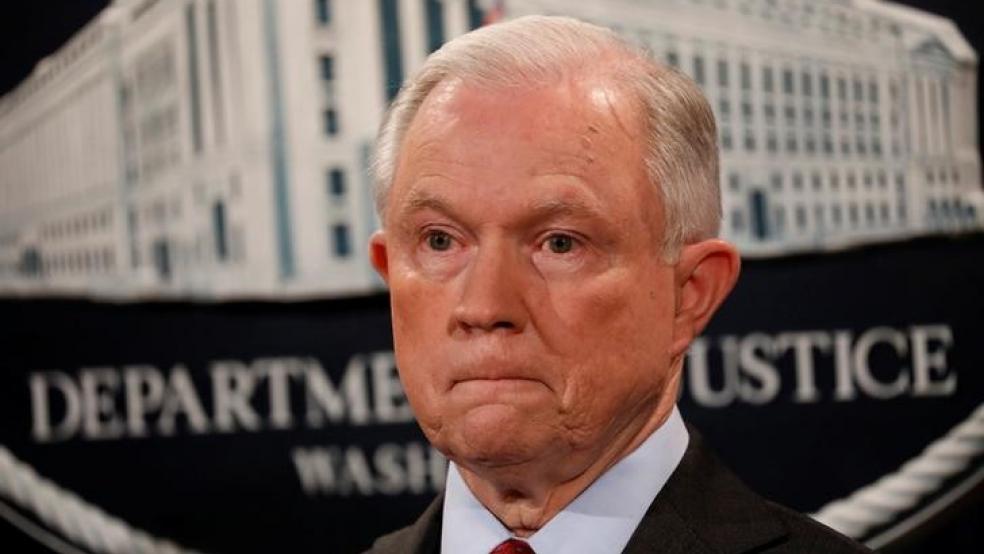In a brief press conference on Thursday, Attorney General Jeff Sessions attempted to set aside the controversy over two undisclosed meetings with Russian Ambassador Sergei Kislyak during last year’s presidential campaign. Neither meeting was private. One was at a conference held by the Heritage Foundation with a large group of people. The second was with two members of his staff present.
Sessions announced that he would recuse himself from the ongoing investigation into connections between President Donald Trump’s campaign staff and the Russian government, which the US Intelligence Community has accused of interfering in the election on Trump’s behalf.
Sessions claimed, in effect, that he had misunderstood a question posed by Sen. Al Franken (D-MN) during his confirmation hearing. Asked whether he knew of any contact between Trump campaign officials, of which he was one, and figures in the Russian government, he said that he did not, adding, “I did not have communications with the Russians.”
Related: Kremlin: Ambassador Didn’t Meet Sessions (But It Would Have Been OK If He Did)
On Thursday, Sessions said that he had understood the question to be about whether he had had discussions about the election with Russian officials, which he says he did not. “In retrospect, I should have slowed down and said I did meet one Russian official a couple times, and that would be the ambassador,” he explained during his press conference.
Sessions’ announcement that he would recuse himself was plainly meant to defuse a controversy that looked increasingly dangerous for the Trump administration, but in several ways, all it did was to refocus the questions that will be brought up by political opponents and even concerned allies.
Sessions is still in charge.
The fact that he has recused himself from the investigation into the Trump campaign’s alleged connections to the Kremlin won’t come close to satisfying Democrats who remain furious at the possibility that Russian interference may have cost Democrat Hillary Clinton the presidency.
The job of overseeing the investigation and making the difficult calls associated with it, such as whom to subpoena and whether or not any charges should ultimately be brought will fall to the deputy attorney general, who works for...Jeff Sessions. The job is currently filled on an interim basis by Dana J. Boente, the United States attorney for the Eastern District of Virginia, pending the confirmation of Rod J. Rosenstein, the United States attorney for Maryland.
Related: Demands for a Special Counsel to Investigate Trump’s Russia Ties Just Got Louder
While both Boente and Rosenstein are respected professionals, the fact that they answer to Sessions in all areas except one will undoubtedly rub many Democrats the wrong way. Among them, no doubt, will be Nancy Pelosi, who this week accused Sessions of lying to Congress and demanded that he resign.
James Comey is still in the mix.
Democrats have been loudly demanding that the investigation of the alleged Trump-Russia connection be put in the hands of someone independent of the power structure in the Justice Department, and their concern extends well beyond Sessions and his deputy. The on-the-ground element of the investigation is being spearheaded by the Federal Bureau of Investigation and its director, James Comey.
Many Democrats have come to harbor serious distrust of Comey because of actions his agency took during the presidential election. Leaks from the FBI to major media outlets late last year seemed designed to shoot down the idea that there was a significant investigation into a Trump-Russia connection under way. At the same time, FBI agents were feeding information damaging to Clinton to Trump surrogate and former New York mayor Rudy Giuliani.
When, less than two weeks before the election, Comey went public with the news that the FBI was investigating a possible security breach connected with Clinton’s use of a private email server while secretary of state, only to report days later that nothing new had been discovered, Democrats accused him of aiding the Trump campaign.
Related: Trump Has a New Reason for His Military Buildup: Job Creation
More Russian contacts keep emerging.
Even as Sessions was speaking to the press Thursday, new reports were emerging of other contacts between officials in the Trump campaign and Russian Ambassador Kislyak. The New York Times on Thursday reported that in December, prior to Trump taking office, former National Security Adviser Michael Flynn and Trump son-in-law and close adviser Jared Kushner met with Kislyak in Trump Tower. That 15-minute meeting was considered a typical formality since members of the new administration-elect to meet were being introduced to ambassadors of many countries at that point.
Also on Thursday USA Today reported that two Trump campaign officials, J.D. Gordon and Carter Page, met with Kislyak during the Republican National Convention in July, just as news about alleged Russian interference in the US presidential election was breaking.
To be clear, neither of these meetings was necessarily nefarious. The Trump Tower gathering was supposedly meant simply to open lines of communication, while the Sessions meeting in July appears to have been part of a reception surrounding the convention. But they contribute to the impression that connections between the Kremlin and Trump’s campaign team ran deeper than advertised.
In the end, Sessions’ recusal isn’t going to make any of these issues go away. He didn’t help matters last night when, in an appearance on Fox News, he appeared to express doubt about whether or not Russia had even tried to interfere in the election at all.
Related: Why Trump Shouldn’t Be So Worried About the Trade Deficit
Host Tucker Carlson asked, “Did the campaign believe that the Russian government, the Putin government, favored Trump over Clinton in this race?”
“I have never been told that,” Sessions said.
“Do you think they did?” Carlson said.
“I don’t have any idea, Tucker, you’d have to ask them,” Sessions replied.
That contradicts the findings of the Intelligence Community, including the FBI, which Sessions oversees as Attorney General.





